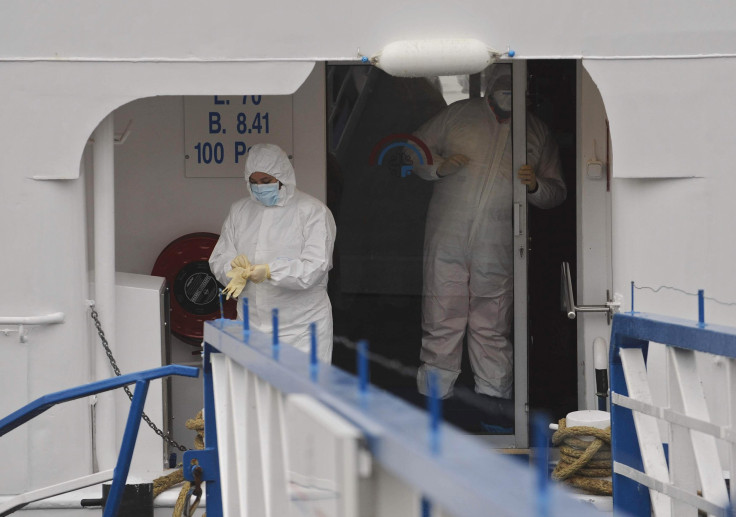The Cost Of Norovirus: Stomach Flu Infections Are Burden On Both Health Care System And Economy

You may recall norovirus as the bug that circulates on cruises and at restaurants, shutting down Chipotles or quickly spreading between students at universities, such as the recent outbreak at the University of Michigan. The reality, however, is that norovirus can be transmitted virtually anywhere — and extracts some $4.2 billion in health care and $60.3 billion in societal costs every year, according to new research.
Every year, some 700 million people around the world fall ill with norovirus, and 219,000 people die from it. It’s a virus that causes stomach problems like nausea, diarrhea, and vomiting, and is often referred to by common names like food poisoning or stomach flu (in fact, both of those things can be caused by norovirus, but they can also be caused by other germs). According to the CDC, norovirus is the most common cause of acute gastroenteritis in the United States. It’s also highly transmissible, easily spread by shaking hands, changing diapers, or touching contaminated surfaces, then touching your mouth afterwards. It’s also very commonly contracted from contaminated foods at restaurants.
The latest study out of Johns Hopkins Bloomberg School of Public Health is one of the first to highlight the economic effects of the norovirus — and to encourage us to pay more attention to preventing outbreaks.
“You only seem to hear about it when people get sick on a cruise ship or at a restaurant, but norovirus is everywhere,” said Sarah Bartsch, research associate at the Bloomberg School, in a statement. “It doesn’t matter how old you are or if you’re in a wealthy country or a poorer one or if you’ve had it before — you can get it again. And it is really unpleasant. But if we don’t focus on norovirus and teach people how to prevent it, little headway will be made to combat it.”
In the study, the researchers used a computer model to estimate the medical and economic costs. For the latter, they found that lost productivity — like missing work, caring for a sick child, premature mortality, or not getting enough work done when you’re sick — was the biggest economic cost. “Productivity losses tend to go unrecognized, but make up 94 percent of the global economic burden of norovirus,” said Dr. Bruce Lee, associate professor at the Department of International Health at the Bloomberg School and senior author of the study, in the press release. The estimated medical costs, meanwhile, involve clinic visits and hospitalizations.
Norovirus hasn't been as pressing in international media as other diseases lately, so its effects are often hidden — but just as concerning, Bartsch notes in an e-mail to Medical Daily. "Norovirus has been around for a while," she wrote. "Some diseases that have gotten more attention such as Ebola and Zika can seem like 'invading' diseases from other continents. So there may be a tendency to overlook what is already 'among us.'"
Preventing Norovirus
There are many ways you can catch norovirus, but according to a recent study, contaminated food touched by infected restaurant workers might be the biggest — contributing to 64 percent of outbreaks. Aside from outbreaks in close quarters like dorms or cruises, it’s also possible to get infected through your pet, vomit particles in the air, or by swimming in lakes.
According to the CDC, hand hygiene may be the number one way to prevent infection. Always wash your hands after using the toilet, changing diapers, or doing anything that involves mildly contaminated conditions — like touching standing water or shaking hands with someone with a cold. Preventing food contamination may be easier at home than when dining out, but it’s important to thoroughly wash fruits and vegetables, as well as cook meats and seafood. If you’re a restaurant worker, stay away from work if you’re sick, especially if you’re prepping or serving the food.
When it comes to swimming in outdoor areas, avoid going in the water if you have diarrhea or vomiting. Parents of children should make sure to take their children out of the water every hour for bathroom breaks, in order to avoid pee and poop in the water. Showering fully before and after the swim, in addition, is a good way to wash off any potential germs.
Since health care facilities are one of the main sources of norovirus infections, it’s important for health care workers like nurses to wear gloves whenever caring for patients who have diarrhea or vomiting. Wipe and disinfect surfaces at work and at home. And perhaps most simply, if you’re ill, you should stay home to rest — which would reduce the number of days you’re sick and decrease lost productivity at work.
“The costs associated with norovirus are high — higher than for many diseases, including rotavirus, that have gotten a lot more attention,” said Lee in the statement. “Our study present an economic argument for greater consideration of norovirus. It has been flying under the radar for too long.”
Source: Bartsch S, Lee B, et al. PLOS ONE , 2016.
Published by Medicaldaily.com



























